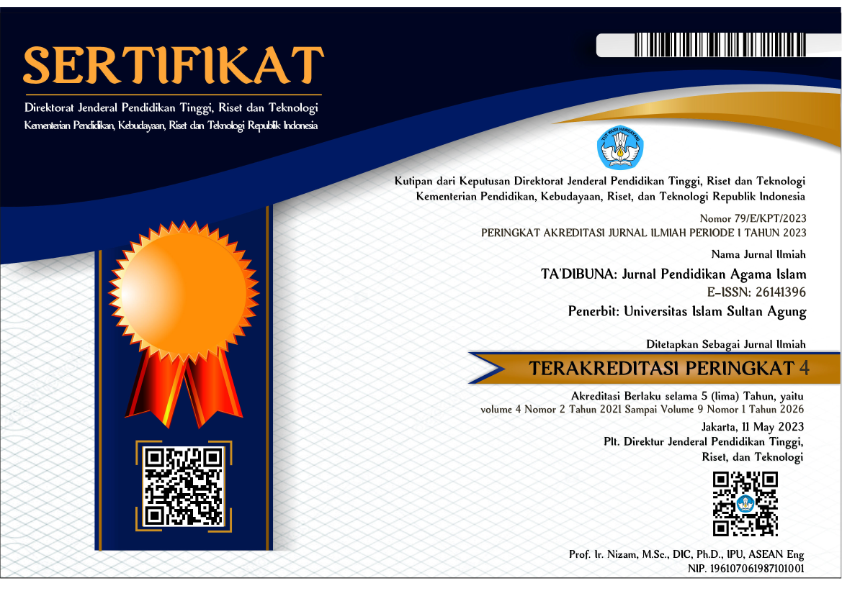Analysis of User Reviews of Online Learning Applications
Abstract
Keywords
Full Text:
PDFReferences
Aaker, D. A. (1997). Brand equity. La gestione del valore della marca. FrancoAngeli.
Ally, M. (Ed.). (2009). Mobile learning: Transforming the delivery of education and training. Athabasca University Press.
Bao, W. (2020). COVID-19 and online teaching in highter education: A case study of Peking University. Human behavior and emergencing technologies, 2 (2), 113-115.
Bozkurt, A., Jung, I., Xiao, J., Vladimirschi, V., Schuwer, R., Egorov, G., ... & Paskevicius, M. (2020). A global outlook to the interruption of education due to COVID-19 pandemic: Navigating in a time of uncertainty and crisis. Asian Journal of Distance Education, 15(1), 1-126.
Chinmi, M., & Marta, R. F. (2020). RuangGuru as an Ideation of Interaction and Education Revolution during COVID-19 Pandemic in Indonesia. Revista Romaneasca Pentru Educatie Multidimensionala, 12(2Sup1), 118-129.
Ellis, V., Steadman, S., & Mao, Q. (2020). ‘Come to a screeching halt’: Can change in teacher education during the COVID-19 pandemic be seen as innovation. European Journal of Teacher Education, 43(4), 559-572.
Fikriya, A. A., Kusumawardani, S. S., & Hidayah, I. (2021, September). Critical Success Factor on E-Learning: Case Study Ruangguru Indonesia. In 2021 4th International Conference of Computer and Informatics Engineering (IC2IE) (pp. 215-220). IEEE.
Hidayat, D. R., Rohaya, A., Nadine, F., & Ramadhan, H. (2020). Kemandirian belajar peserta didik dalam pembelajaran daring pada masa pandemi COVID-19. Perspektif Ilmu Pendidikan, 34(2), 147-154.
Higuchi, K. (2016). KH Coder 3 reference manual. Kioto (Japan): Ritsumeikan University.
Hodges, C. B., Moore, S., Lockee, B. B., Trust, T., & Bond, M. A. (2020). The difference between emergency remote teaching and online learning.
Huang, R., Tlili, A., Chang, T. W., Zhang, X., Nascimbeni, F., & Burgos, D. (2020). Disrupted classes, undisrupted learning during COVID-19 outbreak in China: application of open educational practices and resources. Smart Learning Environments, 7, 1-15.
Inal, Y., Guribye, F., Rajanen, D., Rajanen, M., & Rost, M. (2020, October). Perspectives and practices of digital accessibility: A survey of user experience professionals in nordic countries. In Proceedings of the 11th Nordic Conference on Human-Computer Interaction: Shaping Experiences, Shaping Society (pp. 1-11).
Kementerian Pendidikan dan Kebudayaan Republik Indonesia. (2020). Kebijakan pendidikan dalam masa darurat COVID-19. Retrieved from https://www.kemdikbud.go.id
Kuh, G. D., & O'Donnell, K. (2013). Ensuring quality and taking high-impact practices to scale. Peer Review, 15(2), 32-33.
Kukulska-Hulme, A. (2007). Mobile usability in educational contexts: what have we learnt. The international review of research in open and distributed learning, 8(2).
Ma, X., Khansa, L., Deng, Y., & Kim, S. S. (2013). Impact of prior reviews on the subsequent review process in reputation systems. Journal of Management Information Systems, 30(3), 279–310. https://doi.org/10.2753/MIS0742-1222300310
Marini, Y., Marina, N., Nasution, M. M., & Lubis, M. A. (2021). Aplikasi Ruang Guru Untuk Pembelajaran Di Era Covid-19. Dirasatul Ibtidaiyah, 1(2), 198-214.
Mayer, R. E. (2009). Constructivism as a theory of learning versus constructivism as a prescription for instruction. In Constructivist Instruction (pp. 196-212). Routledge.
Mkpojiogu, E. O., Hussain, A., & Hassan, F. A. (2018, September). A systematic review of usability quality attributes for the evaluation of mobile learning applications for children. In AIP Conference Proceedings, 2016 (1). AIP Publishing.
Nie, L., Wang, M., Zha, Z., Li, G., & Chua, T. S. (2011, July). Multimedia answering: enriching text QA with media information. In Proceedings of the 34th international ACM SIGIR conference on Research and development in Information Retrieval, 695-704.
Paivio, A. (1991). Dual coding theory: Retrospect and current status. Canadian Journal of Psychology/Revue canadienne de psychologie, 45(3), 255.
Prillya, C. R., Gani, S. A., & Marhaban, S. (2021). An investigation of media Ruangguru as educational online platform in studying English. English Education Journal, 12(1), 89-103.
Thomas, D. A., & Nedeva, M. (2018). Broad online learning EdTech and USA universities: symbiotic relationships in a post-MOOC world. Studies in Higher Education, 43(10), 1730-1749.
Vygotsky, L. S., & Cole, M. (1978). Mind in society: Development of higher psychological processes. Harvard university press.
Zhao, Y., Xu, X., & Wang, M. (2019). Predicting overall customer satisfaction: Big data evidence from hotel online textual reviews. International Journal of Hospitality Management, 76, 111-121.
Zhong, Q., Liang, S., Cui, L., Chan, H. K., & Qiu, Y. (2019). Using online reviews to explore consumer purchasing behaviour in different cultural settings. Kybernetes, 48(6), 1242-1263.
Zimmerman, B. J. (2002). Becoming a self-regulated learner: An overview. Theory into practice, 41(2), 64-70.
DOI: http://dx.doi.org/10.30659/jpai.7.1.21-30
Refbacks
- There are currently no refbacks.
Â
Ta'dibuna: Jurnal Pendidikan Agama Islam is published by Master Program of Islamic Education, Faculty of Islamic Studies, Universitas Islam Sultan Agung (UNISSULA), Indonesia.
Jl. Raya Kaligawe Km.4, PO BOX 1054/SM Semarang, Indonesia 50112. Email: jurnaltadibuna@unissula.ac.id.ÂÂ






